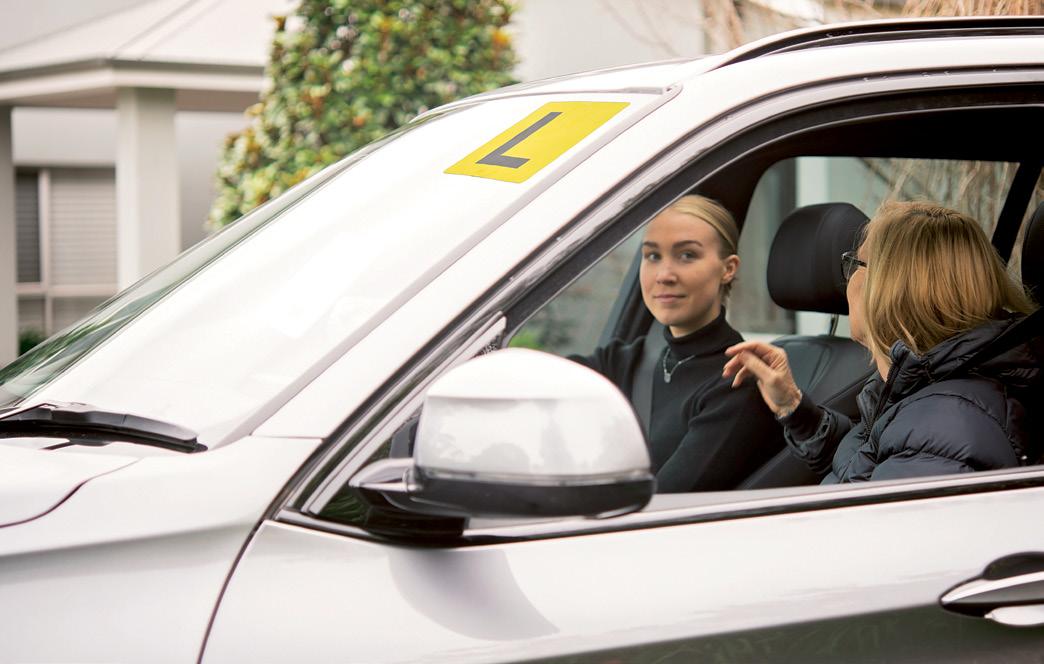
4 minute read
Learner road safety
SUPERVISORY DRIVERS should let learners take more responsibility for road safety once they’ve mastered the technical skills of driving, a leading researcher recommends.
to go Timesolo?
Professor Teresa Senserrick, from the Queensland University of Technology’s Centre for Accident Research and Road Safety - Queensland (CARRS-Q), believes more attention should be placed on road safety awareness when drivers are accruing the 80 mandatory logbook hours prior to the practical driving test. “When you look at risk curves it is very, very safe at the learner stage but that first six to 12 months on your P-plates sees one of the highest spikes of crash rates that you’ll see throughout a driver’s lifespan,” Professor Senserrick says.
Supervisors: prepare learners for their first solo drive
Supervisors tended to share too much of the responsibility during instruction, which meant the learner was not gaining the safety skills needed for driving on their own.
“They keep managing things for them,” Professor Senserrick says. “Some early research from France talked about driving with two heads because the parent was still going ‘watch out for this’ or ‘you focus on the car and I’ll do this’.
“There’s something that’s just very fundamentally different when you first go out and you’re driving without a supervisor.” Professor Senserrick said the lack of practical

The two types of skills
Learner drivers gain two types of driving skills: ‘lower-order’ and ‘higher-order’ skills. Everyone develops these skills at a different pace.
When you first begin to drive, you learn lower-order skills, including:
How to use the car’s controls (such as brakes, steering wheel and gears)
How to control the car’s movement
How to use the car’s controls without thinking about them. As you gain more driving experience, you begin to learn higher-order skills, such as:
Perception
Decision-making
Having spare attention.
This is where road safety should become a focus for supervisory drivers.
experience and an inability to identify potentially dangerous situations contributed to the high number of crashes involving young drivers.
“If you’re judging whether your child is ready to go and do that driving test, you should be able to be sitting there and not be saying anything,” she says. “You should have transferred all the learning and the skills so that the young person is doing everything themselves.
The ideal time for supervisors to begin to focus more on road safety is when learners start to gain higher-order skills (see table left).
Professor Senserrick recently spoke to Royal Automobile Club of Queensland (RACQ) about young driver safety and is currently working with the Department of State Growth on the topic.
With more than 20 years’ experience in road safety, Professor Senserrick is nationally and internationally recognised for her work in this field. Her PhD in developmental psychology explored adolescent motivation and risk taking, and young drivers continue to be a focus of her research.
Give them the Keys2drive
All learner drivers and their supervisors are eligible to receive a free Keys2drive lesson.
The driving lesson, with a Keys2drive accredited professional driving instructor, incorporates information and strategies for managing the early solo driving stage. It also includes a practical demonstration on how to self-assess, self-instruct and self-supervise.
Tasmanian learners can also access a free Plates Plus lesson. Visit ract.com.au/cars-and-driving/driver-training
Learner driver? Get two FREE driving lessons.

If you’re a Tasmanian learner car licence holder, you can access a Keys2drive AND a Plates Plus driving lesson for free, to help you get to your provisional licence.
Keys2drive is a free one-hour lesson that includes theory and driving taught by a certified instructor.
• Learners need to bring their supervising driver along for both the theory and practical parts of the lesson. • Learners will develop skills for safer driving, and supervising drivers will get tips to help them along the way. On completion, you’ll then be eligible for a free Plates Plus lesson.
The Plates Plus lesson is a free one-hour on-road driving lesson.
• Learners can work with their instructor on driving tasks they need more practice with.
They can also choose to bring a supervising driver. • Tasmanian learners are only eligible for this free lesson once they have completed their free Keys2drive lesson.










